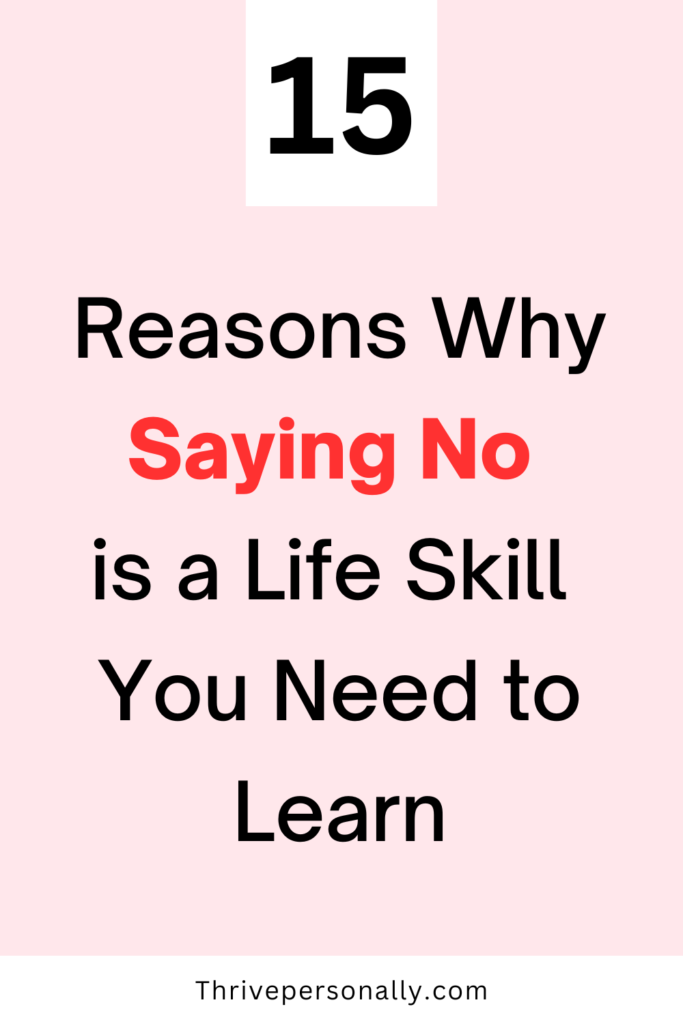Learning how to say “no” is one of the most valuable life skills you can develop, yet it’s often something that many people struggle with. For some, it may feel uncomfortable or even guilt-inducing, but being able to say “no” is a key component of maintaining a balanced and healthy life. Whether it’s in personal relationships, at school, or in the workplace, being able to decline requests, offers, or obligations is crucial to protecting your time, energy, and well-being.
You might be surprised at how many benefits come with saying “no” and how much easier life can be when you learn to assert your boundaries. In fact, learning how to say “no” can help you lead a more focused, productive, and stress-free life. In this blog post, we will explore
Here are the 15 reasons why saying “no” is an essential life skill that you need to learn.
1. Protects Your Time
Your time is limited, and it’s one of the most valuable resources you have. There are only 24 hours in a day, and once those hours are gone, you can’t get them back. If you’re constantly saying “yes” to requests from others without considering whether it fits into your schedule, you can easily find yourself overwhelmed, stressed, and running out of time for the things that matter most to you.
Saying “no” helps you protect your time, giving you the opportunity to prioritize your most important tasks. Whether it’s focusing on your studies, spending time with family, or pursuing personal interests, saying “no” allows you to allocate time to what truly matters. It’s easy to get caught up in pleasing others or feeling obligated to do everything, but remember: your time is precious, and saying “no” is one of the best ways to take control of it.
Related: 8 Simple Tips to Beat Procrastination and Get Things Done
2. Prevents Overloading Yourself
We all have limits, and overloading yourself can quickly lead to burnout. When you say “yes” to too many things, especially when you’re already busy, you risk pushing yourself beyond your limits. This can result in physical and mental exhaustion, stress, and a decrease in your overall well-being.
Saying “no” helps you recognize your limits and avoid overcommitting. It allows you to keep your responsibilities manageable, which ultimately leads to better performance in the tasks you choose to take on. Overloading yourself with commitments can negatively impact your work, school, and personal life, so it’s important to learn when to draw the line and say “no.”
Related: Habits That Will Completely Change the Way You Think
3. Helps You Stay Focused on Your Priorities
Everyone has different priorities, whether they are academic, professional, or personal. Saying “yes” to everything can easily lead to losing sight of what really matters to you. It’s easy to get distracted by other people’s needs or desires, but if you’re constantly saying “yes” without thinking, you may end up neglecting your own goals.
Learning to say “no” allows you to stay focused on your own priorities and what’s most important to you. Whether it’s working on a school project, advancing your career, or nurturing your personal relationships, saying “no” helps you create the space you need to focus on the things that align with your values and long-term goals. It’s a way to put your needs first without feeling guilty.
Related: 8 Surprising Benefits of Meditation That Can Transform Your Life
4. Improves Your Mental Health

When you say “yes” to things you don’t want to do or can’t handle, it can quickly take a toll on your mental health. Feelings of stress, anxiety, and resentment can build up, and you may start feeling overwhelmed by everything you’re juggling. The pressure of constantly saying “yes” can even lead to feelings of inadequacy if you’re unable to fulfill all your commitments.
By learning to say “no,” you give yourself the opportunity to reduce stress and protect your mental health. It allows you to avoid overburdening yourself and focus on taking care of your emotional well-being. Setting healthy boundaries is crucial for maintaining your mental health, and saying “no” is an important part of that.
5. Builds Stronger Boundaries
Boundaries are essential in all aspects of life. They help protect your time, energy, and resources, and they ensure that you’re able to maintain healthy relationships with others. When you don’t have clear boundaries, it’s easy to feel taken advantage of or overwhelmed by the demands of others.
Saying “no” helps you establish and maintain healthy boundaries. When you’re able to confidently decline requests that don’t align with your needs or values, you send a clear message to others that you respect yourself and your limits. Strong boundaries not only help protect your well-being but also make your relationships stronger by fostering mutual respect.
6. Shows You Value Yourself
Saying “no” is an act of self-respect. It shows that you value your time, energy, and well-being, and that you are not just willing to do things out of guilt or obligation. By asserting your right to say “no,” you demonstrate that your needs and desires matter.
When you prioritize your own needs, you cultivate a sense of self-worth and confidence. You’re telling others that you are not defined by how much you do for them or how much you can give. Learning to say “no” is a powerful way to reinforce your sense of value and make sure that your personal well-being is prioritized.
7. Fosters Self-Control
Saying “no” isn’t always easy, especially when you’re used to saying “yes” all the time. It requires a great deal of self-control to resist the urge to please others or avoid confrontation. However, the more you practice saying “no,” the better you will get at controlling your impulses.
Being able to resist saying “yes” when it’s not in your best interest strengthens your ability to make thoughtful decisions. Self-control is a key life skill that helps you stay focused on your long-term goals and avoid distractions that could pull you off course.
8. Encourages Honest Communication
Saying “no” is a form of honest communication. Instead of pretending to agree with something or going along with something you’re not comfortable with, saying “no” allows you to be upfront about your feelings and needs. It’s an important part of being transparent and authentic in your interactions with others.
Honest communication fosters trust and respect in relationships. When you are open and truthful about what you can and cannot do, others will appreciate your integrity and be more likely to respect your boundaries in the future.
9. Promotes Time for Self-Care
Self-care is essential for maintaining your physical, emotional, and mental well-being. If you’re constantly saying “yes” to other people’s demands and ignoring your own needs, you may find yourself running on empty. Taking time for yourself is crucial for recharging and staying healthy.
Saying “no” helps you carve out time for self-care. It gives you the space you need to relax, unwind, and focus on your own needs. Whether it’s getting enough sleep, exercising, or doing something that brings you joy, saying “no” allows you to prioritize self-care without feeling guilty.
10. Helps You Avoid Resentment
When you say “yes” to something you don’t want to do, you might feel resentment toward the person who asked or even toward yourself for not standing up for your own needs. This can lead to negative feelings and strain relationships over time.
By learning to say “no,” you can avoid building up resentment. Saying “no” helps you stay true to yourself and avoid agreeing to things out of pressure or obligation. When you say “no” politely and confidently, it allows you to maintain your integrity without harboring negative feelings.
11. Improves Decision-Making Skills
The ability to say “no” requires you to make thoughtful decisions about what’s best for you. It encourages you to evaluate your options and consider the consequences of your choices before agreeing to anything. Instead of rushing into decisions out of a desire to please others, saying “no” helps you make more deliberate and well-informed choices.
Improved decision-making skills allow you to better navigate the challenges and opportunities that come your way. It helps you stay focused on your goals and make choices that align with your values.
12. Teaches You to Prioritize
In a world where everyone has competing demands on your time and energy, it’s crucial to learn how to prioritize. Saying “no” allows you to focus on the most important tasks and commitments, ensuring that you’re spending your time on what matters most.
By saying “no” to less important requests or obligations, you create space for the things that truly matter to you. Prioritizing helps you stay on track with your goals and prevents you from spreading yourself too thin.
13. Helps You Build Respect in Relationships
When you are able to set clear boundaries and say “no” in a respectful way, you gain respect from others. People will understand that you are someone who values yourself and your time, and they will be more likely to treat you with the same respect. Saying “no” doesn’t mean you don’t care about others—it simply means you are taking care of yourself.
Building respect in relationships is essential for creating healthy, balanced connections with others. Saying “no” can actually strengthen relationships by fostering mutual understanding and appreciation.
14. Increases Your Productivity
If you say “yes” to everything, you end up spreading yourself too thin and losing focus. Saying “no” helps you focus your energy and attention on the most important tasks, which can increase your productivity. When you aren’t constantly distracted by unrelated requests or commitments, you can dedicate more time and effort to the things that truly matter.
Increased productivity leads to better outcomes in your personal and professional life. By learning to say “no,” you set yourself up for success by ensuring that you’re giving your best effort to the tasks that align with your goals.
15. Empowers You to Live Authentically
Ultimately, saying “no” empowers you to live authentically. It allows you to make choices that align with your true desires and values, rather than succumbing to external pressures or trying to please others. When you say “no,” you take control of your life and assert your right to make decisions that are in your best interest.
Living authentically leads to greater satisfaction and fulfillment in life. When you can say “no” confidently and without guilt, you are free to pursue your passions, protect your well-being, and live the life you truly want.
Conclusion
Saying “no” is an essential life skill that everyone needs to learn. It’s not always easy, especially when we want to avoid conflict or please others, but the benefits far outweigh the discomfort. By learning to say “no,” you protect your time, energy, and well-being, while also creating space for the things that truly matter to you. It helps you prioritize, reduce stress, build stronger relationships, and live more authentically.
Remember, saying “no” doesn’t make you selfish—it makes you self-respecting. It’s a powerful tool for maintaining balance, staying focused, and living a healthier, more fulfilling life. So, the next time you feel overwhelmed with requests, take a deep breath and remember that it’s okay to say “no.”
Save the pin for later



